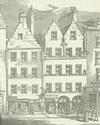 In a chapbook by Dougal Graham, the "Skellat Bellman" of Glasgow in the 1770s, The History of the Haverel Wives, one woman recalls to another the joyful Sundays back in pre-reformation days. When the bell rang to mark the end of Sunday service "every body ran to the kirk, were it to buy saut or shune, (salt or shoes), for the chapman chiels set up a' their creams (booths) at the kirk-door". The lasses would buy "keeking glasses" or mirrors, as well as needles, pins, shoemakers' awls, gimlets, brown bread and black soap, "forby sweety wives things", and rattles for "restless little anes"; men would settle for pints and a "whang", or chunk, of cheese.
In a chapbook by Dougal Graham, the "Skellat Bellman" of Glasgow in the 1770s, The History of the Haverel Wives, one woman recalls to another the joyful Sundays back in pre-reformation days. When the bell rang to mark the end of Sunday service "every body ran to the kirk, were it to buy saut or shune, (salt or shoes), for the chapman chiels set up a' their creams (booths) at the kirk-door". The lasses would buy "keeking glasses" or mirrors, as well as needles, pins, shoemakers' awls, gimlets, brown bread and black soap, "forby sweety wives things", and rattles for "restless little anes"; men would settle for pints and a "whang", or chunk, of cheese.
 Glasgow's population was 7,000 in 1600; by 1801 it numbered 77,385. All of these people had to eat daily, clothe themselves and, as the economy developed, they increasingly demanded some of Life's small luxuries. However, since most folk worked twelve or fourteen hour days there was little opportunity for shopping, of either the acquisitive, or window, variety. From the late 17th century many shopkeepers were found catering to the needs of the community, such as tailors, weavers, bonnet-makers, fleshers, candlemakers and printers. In 1695 the bakers went on strike after thirteen of them were jailed for infringing the Town Council's strict regulations about the weight and quality of bread.
Glasgow's population was 7,000 in 1600; by 1801 it numbered 77,385. All of these people had to eat daily, clothe themselves and, as the economy developed, they increasingly demanded some of Life's small luxuries. However, since most folk worked twelve or fourteen hour days there was little opportunity for shopping, of either the acquisitive, or window, variety. From the late 17th century many shopkeepers were found catering to the needs of the community, such as tailors, weavers, bonnet-makers, fleshers, candlemakers and printers. In 1695 the bakers went on strike after thirteen of them were jailed for infringing the Town Council's strict regulations about the weight and quality of bread.
 George Eyre-Todd describes a day in the life of the city c. 1720. Just after 6.00 a.m. a gun was fired to signal that people could collect the recently arrived mail. Then the shops would open. The poorer premises would front on the street with living quarters of one or two rooms behind. Posher stores had domestic accommodation above them, tenement-style. Most shops, however, took the form of booths or stalls set up in the High Street and the Trongate. Fresh vegetables were supplied from nearby nurseries by "gardeners". Customers expected to haggle to reduce prices. Housewives and servants would "do their messages" (a uniquely Scottish expression: in Scotland an errand-boy was a message-boy). A boiling fowl might cost threepence, grilse (from the Clyde) a penny a pound.
George Eyre-Todd describes a day in the life of the city c. 1720. Just after 6.00 a.m. a gun was fired to signal that people could collect the recently arrived mail. Then the shops would open. The poorer premises would front on the street with living quarters of one or two rooms behind. Posher stores had domestic accommodation above them, tenement-style. Most shops, however, took the form of booths or stalls set up in the High Street and the Trongate. Fresh vegetables were supplied from nearby nurseries by "gardeners". Customers expected to haggle to reduce prices. Housewives and servants would "do their messages" (a uniquely Scottish expression: in Scotland an errand-boy was a message-boy). A boiling fowl might cost threepence, grilse (from the Clyde) a penny a pound.